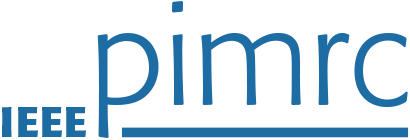The annual IEEE International Symposium on Personal, Indoor and Mobile Radio Communications (PIMRC) is one of the premier conferences in the wireless research arena and has a long history of bringing together academia, industry and regulatory bodies. Today, it has become one of the IEEE Communication Society’s flagship conferences in wireless communications and networking. In 2019, this important wireless event will be held in Istanbul, Turkey. PIMRC 2019 will include technical sessions, tutorials, workshops, and technology and business panels. You are invited to submit papers, as well as proposals for panels, tutorials, and workshops, in all areas of wireless communications, networks, services, and applications. The potential topics include, but are not limited to:
| Track 1: Fundamentals and PHY (Submit a paper)
|
Track 3: Mobile and Wireless Networks (Submit a paper)
|
| Track 2: MAC and Cross-Layer Design (Submit a paper)
|
Track 4: Services, Applications and Business (Submit a paper)
|
Papers should be written in English with a maximum paper length of six (6) printed pages (10-point font) including figures without incurring any page charges. One additional page is permitted with an overlength page charge of USD100. Papers exceeding 7 pages will not be accepted on EDAS. Accepted papers will be published in the PIMRC 2019 Proceedings, and the papers presented by an author at the conference will be submitted to IEEE Xplore.
Important Dates
| Full Paper Submission: | 12 April 2019 (Final Extension) |
| Notification of Acceptance: | 7 June 2019 |
| Final Manuscript: | 28 June 2019 |
| Workshop Paper Submission: | 30 May 2019 (Final Extension) |
| Tutorial Proposals: | 31 March 2019 (Extended) |
| Panel Proposals: | 30 April 2019 (Extended) |
Organizing Committee
| General Chairs | Hikmet Sari (NJUPT, Nanjing) Erdal Panayirci (Kadir Has University) |
| Technical Program Chairs | Tolga M. Duman (Bilkent University) Murat Uysal (Ozyegin University) |
| Workshop Chairs | Angeliki Alexiou (University of Piraeus) Ozgur B. Akan (Cambridge University) |
| Tutorial Chairs | Hanna Bogucka (Poznan University of Technology) Onur Kaya (ISIK University) |
| Panels Chairs | Erol Hepsaydir (3G Hutchison) Peiying Zhu (Huawei) |
Author and Submission Guidelines
Warning on Plagiarism
Papers will be reviewed on the basis that they do not contain plagiarized material and have not been submitted to any other conference at the same time (double submission). These matters are taken very seriously and the IEEE will take action against any author who has engaged in either practice.
IEEE Web Page on Double Submission
Submission Format
Authors are required to make sure that the PDF file and the EDAS registration page of a submitted paper have the same list of authors, title, and abstract (minor wording differences in the abstract are ok). Failure to comply with this rule may lead to the withdrawal of your paper from the review process. Please note that the authors list of an accepted paper CANNOT be changed in the final manuscript.
All submissions should be written in English with a maximum paper length of seven (7) printed double-column pages (10-point font) including figures. Authors of accepted papers with camera-ready versions exceeding 6 pages will be requested to pay a mandatory overlength page charge for their papers to be published in the IEEE PIMRC 2019 Conference Proceedings and submitted for inclusion in IEEE Xplore®.
Standard IEEE conference templates for LaTeX formats are found here.
You can also use the sample template for Microsoft Word in US Letter format.
Only PDF files generated by Acrobat 5 or later versions will be accepted for both the review processing and final publication steps. Camera-ready versions of accepted papers must be certified by PDFeXpress.
Both review versions of submitted papers and camera-ready versions of accepted papers should not embed bookmarks, form fields, or URL links (cf. Note 1 below), neither contain page numbers, headers, footers, or PDF annotations . Paper pages should be in US Letter or A4 format with left and right margins of at least 1 in, a top and bottom margins of at least 0.75 in and 1 in, respectively, and a gutter of 0.1 in between columns (cf. Notes 2 and 3 below).
Note 1: Please make sure that you remove hyperlinks to all email addresses in the authors’ affiliations or to all webpage reference citations in the bibliography section.
Note 2: Complying with the PIMRC 2019 format constraints indicated above might not be sufficient to avoid PDF upload issues on EDAS. In case you face embedded fonts issues, please refer to the following IEEE Tutorial.
Note 3: For authors using the LaTeX template, a warning may show up once their papers are uploaded successfully. If the warning indicates that you are exceeding the right margin at the last page (i.e., where your references are most likely listed), you can ignore it!In fact, the IEEE template does not allow to break a reference, leading to an “underfull vbox” warning, but the final result will be much more like what the IEEE will publish.


